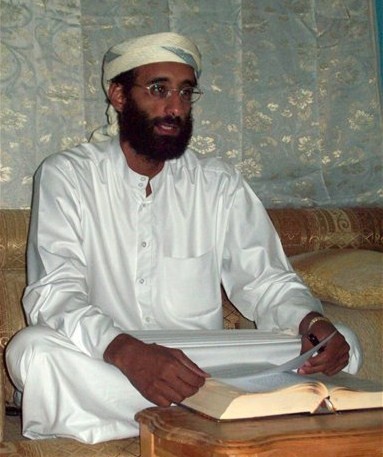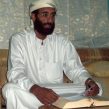
The Radical Source for Non-Arabic Speaking Muslims: Anwar al-Awlaki
Publication: Terrorism Monitor Volume: 8 Issue: 2
By:

In November 2001, an American Muslim cleric told the Washington Post that he had no sympathy for the perpetrators of 9/11, that Muslims and non-Muslims needed “more mutual understanding,” and that the Taliban had no right to impose the burqa on women (Washington Post, November 19, 2001). The cleric, Shaykh Anwar al-Awlaki, is the same man who is now believed to have played a major role in radicalizing Major Nidal Malik Hasan, the U.S. army psychiatrist who killed 13 American soldiers at Fort Hood last November, and 23-year-old Nigerian Umar Farouk Abdulmutallab, who tried to detonate explosives aboard an airliner over Detroit on Christmas Day.
In an exclusive interview, al-Awlaki told Yemeni journalist Abdulilah al-Sha’i (the only journalist to interview the leader of al-Qaeda in Yemen, Abu Basir al-Wuhayshi), that Major Hasan contacted him on December 17, 2008, to inquire about the legitimacy of killing American soldiers and officers. Further correspondence discussed Shari’a-based justifications for killing Israeli civilians. Al-Awlaki considered the Fort Hood attack a legitimate act of jihad as it was a military target and described Hasan’s attack as a “heroic act.” At the same time, al-Awlaki said that he has not recruited Hasan. “America did with its crimes and injustices” (al-Jazeera, December 23, 2009). A Yemeni official stated that Nigerian terror suspect Abdulmutallab met al-Awlaki in Shabawa, east of Sana’a. (AFP, January 7).
There is a huge difference between the moderate statements al-Awlaki made in the period between 2001-2002 and the radical views he has expressed since 2007. In the intervening period, al-Awlaki moved to Yemen, where he was banned from re-entering the United States and detained without charge in a Yemeni prison for over a year. Al-Awlaki believes he was imprisoned at the request of the United States, but describes his detention as “a chance to review the Quran and to study and read in a way that was impossible out of jail. My time in detention was a vacation from this world” (Interview with Infocusnews.net [Anaheim], September 17, 2008). The shaykh says he was interrogated in prison by the FBI about his connections to the 9/11 terrorists (Interview with cageprisoners.com, December 31, 2007).
After his release, al-Awlaki translated and summarized the works of Yusuf al-Ayiri, an al-Qaeda ideologist who was killed in a security operation in northern Saudi Arabia in 2003 (muslim.net, Jan 15, 2009; Asharq al-Awsat, April 30, 2007). He then went on to write the guide 44 Ways to Support Jihad, in which he says, "Jihad today is obligatory on every capable Muslim. So as a Muslim who wants to please Allah it is your duty to find ways to practice it and support it." The 44 ways of supporting jihad include giving the mujahideen money, praying for them, preserving their secrets, sponsoring their families, providing moral encouragement and urging others to join the jihad.
In the same book, al-Awlaki encourages followers to be "Internet mujahideen" by, among other things, "setting up websites to cover specific areas of jihad, such as: mujahideen news, Muslim POWs and jihad literature." Al-Awlaki also offers some advice to potential mujahideen: “Shaykh Abdullah Azzam used to say: ‘Luxury is the enemy of jihad.’ Jihad is difficult and demands sacrifice. Therefore avoiding the life of luxury removes some of the obstacles that may stand between a person and Jihad. You need to be able to sleep on the floor, eat food different than what your mother or wife cooks for you, use cold water for [ablutions] and not mind being unable to take a shower everyday.” The would-be jihadist is also advised to learn Arabic, he argues, saying, “Arabic is the international language of jihad. Most of the jihad literature is available only in Arabic and publishers are not willing to take the risk of translating it. The only ones who are spending the money and time translating jihad literature are the Western intelligence services…and too bad, they would not be willing to share it with you.” [1] The book was published on the shaykh’s blog, www.anwar-alawlaki.com, currently offline.
Furthermore, in a lecture entitled “Allah is Preparing us for Victory” (recommended reading by many jihadi forum contributors), al-Awlaki says, “Some Muslims say the way forward for this Ummah [community] is to distance itself from terrorism and spend their time in becoming good in business, good in technology, agriculture, and the rest; and this is how we can compete with the rest of the world. The Prophet of God (p.b.u.h) said that this is wrong and Allah will dishonor us if we do that” (salaattime.com, n.d.; see also muslim.net November 9, 2009).
Al-Awlaki was born in New Mexico in 1971, when his father, Nasser al-Awlaki, a former government minister before the 1994 unification of North and South Yemen, was studying there. Anwar spent his childhood in Yemen, returning to the United States in 1991 to obtain a BA in engineering from Colorado University and a Master’s degree in education from San Diego University. Al-Awlaki then served as Imam of a San Diego mosque, where he met Khaled al-Mihdar and Nawaf al-Hazmi, two of the 9/11 hijackers. In 2001 he became Imam of Dar al-Hijrah mosque in Falls Church, Virginia, near Washington, before leaving the United States in 2002. His next stop was London before leaving for Yemen, where he spent 18 months in prison, for reasons that remain unclear (hanein.info, November 13, 2009; albidaweb.com, December 26, 2009). Currently he is based in Shabawa, east of Sana’a, and is associated with Shaykh Abdulmajeed Zandani’s al-Iman University. He is apparently living among his tribal relatives as he belongs to one of the largest tribes in southern Yemen. His relatives have warned against targeting him, saying it would escalate the tension the country is already experiencing instead of calming it down (albidaweb.com, December 26, 2009).
It is worth noting that al-Qaeda in the south of Yemen is uniquely combined with the tribal structure (explaining the protection al-Awlaki is being offered), but it is worth noting that al-Awlaki’s influence is greater among non-Arabic speakers. In Arabic language jihadi forums, Anwar al-Awlaki’s writings are very rare as most of them are in English and more Western-oriented. They are made available in different e-libraries and Islamic e-bookshops in the United States and the UK, where his radical views form a major resource for non-Arabic speaking Muslims, especially in the West.
Notes:
1. Translation from https://www.nefafoundation.org/miscellaneous/FeaturedDocs/nefaawlaki44wayssupportjihad.pdf





